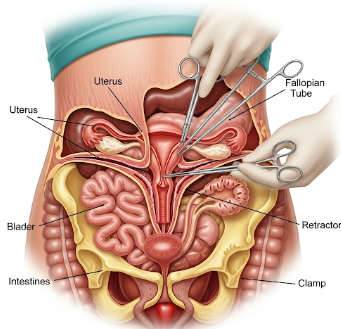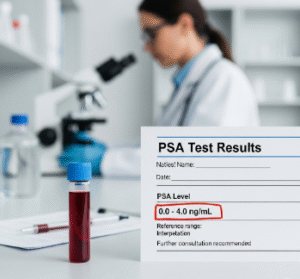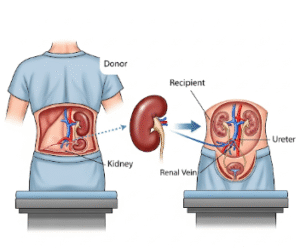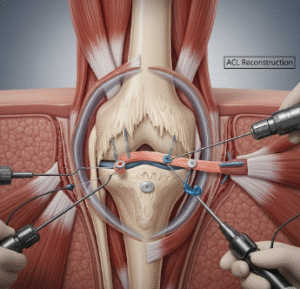Overview
Abdominal hysterectomy is a surgical procedure to remove the uterus through an incision in the lower abdomen. It is typically recommended for women with large fibroids, extensive endometriosis, uterine prolapse, or malignancy where minimally invasive approaches are not suitable.
South Korea is renowned for its expert gynecologic surgeons, advanced surgical facilities, and meticulous post-operative care. International patients choose Korea for precision, safety, and faster recovery, especially for complex abdominal hysterectomies.
What is Abdominal Hysterectomy?
Abdominal hysterectomy involves:
- Making a lower abdominal incision (usually horizontal, sometimes vertical)
- Removing the uterus, and sometimes the cervix, fallopian tubes, and ovaries depending on the condition
- Suturing the incision with attention to cosmetic outcome and minimal scarring
It is generally recommended when:
- Uterus is too large for vaginal or laparoscopic removal
- Multiple or complex fibroids are present
- Pelvic anatomy is altered due to prior surgeries or conditions
- Malignancy requires direct access for proper removal
What are the Benefits?
- Definitive treatment for uterine conditions like fibroids, endometriosis, or cancer
- Relief from symptoms such as heavy bleeding, pelvic pain, or pressure
- Improved quality of life with permanent resolution of uterine-related problems
- Allows concurrent removal of ovaries or fallopian tubes if needed
- Safe and well-established procedure with predictable outcomes in Korea
- Advanced surgical techniques reduce complications and promote faster recovery
Procedure Details
1) How should I prepare for Abdominal Hysterectomy?
- Comprehensive evaluation → Blood tests, imaging (ultrasound, MRI), ECG, Pap smear
- Medication review → Adjust or stop blood thinners or other medications as instructed
- Fasting → Typically 6–8 hours prior to surgery
- Bowel preparation → May be recommended depending on surgical plan
- Pre-operative consultation → Discuss incision type, potential removal of ovaries/tubes, recovery timeline, and risks
2) What happens during the procedure Abdominal Hysterectomy?
- Anesthesia → General anesthesia administered by a specialized anesthesiologist
- Surgical steps →
- Lower abdominal incision made (horizontal or vertical)
- Uterus carefully dissected and removed
- Fallopian tubes and ovaries may be removed if indicated
- Hemostasis ensured and incision closed with sutures
- Duration → Typically 1–2 hours, depending on complexity
- Monitoring → Continuous monitoring of heart rate, blood pressure, oxygen saturation
3) What happens after an Abdominal Hysterectomy?
- Recovery room → Patient monitored until awake and stable
- Hospital stay → Usually 3–5 days depending on recovery and procedure complexity
- Pain management → Oral or intravenous analgesics provided
- Activity restrictions → Avoid heavy lifting, strenuous activity, or sexual intercourse for 4–6 weeks
- Wound care → Keep incision clean and dry; monitor for infection
- Follow-up visits → Surgical check-ups to ensure proper healing and address any complications
Risks / Benefits
Risks
- ➤ Bleeding or hematoma at incision site
- ➤ Infection of incision or pelvic organs
- ➤ Injury to bladder, ureters, or bowel (rare)
- ➤ Blood clots in legs or lungs
- ➤ Early menopause if ovaries removed
- ➤ Scar formation and abdominal discomfort
Benefits
- ➤ Permanent resolution of uterine conditions
- ➤ Improved quality of life and symptom relief
- ➤ Safe and well-established procedure with predictable outcomes
- ➤ Ability to address multiple conditions simultaneously
- ➤ Comprehensive post-operative care in Korea
Recovery and Outlook
- Immediate recovery → Mild to moderate pain; managed with medications
- Hospital stay → 3–5 days depending on procedure and recovery
- Activity resumption → Light activities after discharge; full recovery in 4–6 weeks
- Long-term outlook → Most women experience complete relief from symptoms
- Hormonal considerations → If ovaries are removed, hormone replacement therapy may be needed
- Follow-up care → Regular gynecological check-ups to ensure proper healing and monitor hormonal status
South Korea provides advanced post-operative care, including pain management, wound care, physiotherapy, and counseling for hormonal changes, ensuring smooth and safe recovery.
When To Call the Doctor
Contact your surgeon immediately if you notice:
- ⚠️ Heavy bleeding or persistent discharge from incision
- ⚠️ Fever, chills, or signs of infection
- ⚠️ Severe abdominal pain not relieved by medications
- ⚠️ Swelling, redness, or opening of incision
- ⚠️ Shortness of breath, leg swelling, or chest pain (possible blood clot)
- ⚠️ Urinary problems or bowel difficulties
Best Korea Option / Process
South Korea is a preferred destination for abdominal hysterectomy due to:
- Highly experienced gynecologists and surgeons
- State-of-the-art surgical facilities
- Comprehensive post-operative care and monitoring
- Minimally invasive alternatives available for suitable patients
- International patient support, including language assistance and hospital coordination
Top Hospitals for Abdominal Hysterectomy in Korea:
- Asan Medical Center, Seoul – Expertise in complex gynecologic surgeries
- Samsung Medical Center – Skilled in abdominal and minimally invasive hysterectomies
- Seoul National University Hospital (SNUH) – Comprehensive pre- and post-operative care
- Yonsei Severance Hospital – Advanced surgical techniques with international patient support
👉 For women with complex uterine conditions requiring abdominal access, Abdominal Hysterectomy in Korea provides safe, advanced, and effective treatment with high success rates and excellent recovery programs.













